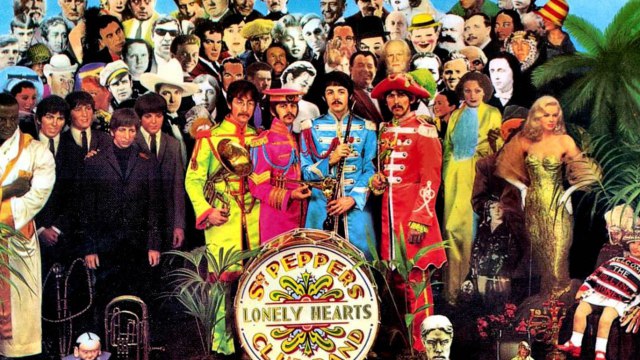
“It was fifty years ago today that Sgt Pepper taught the band to play…”
HAILED by many as the “most important rock & roll album of all time”, Sgt Pepper’s Lonely Hearts Club Band changed the course of music forever when it was released fifty years ago on 1st June 1967. Bold, uplifting and utterly fearless in nature, the album ushered in an unforgettable period of giddy optimism, hope and discovery in the late sixties, along with a season that ultimately became known as the Summer of Love.
Often the subject of intense scrutiny and analysis, it’s hard to think of a record that captures the essence of an era more vividly than The Beatles’ seminal LP. And while we can’t be affected by its sonic innovations in the same way as its listeners were in 1967, the band’s message still feels wholly relevant today. Promoting diversity, inclusion and hopeful optimism across its iridescent instrumentation and fantastical lyrics, Sgt Pepper continues to teach us an important lesson; a lesson that feels all the more powerful in the post-Brexit, Trump-era world we find ourselves in today, plagued with divisions and uncertainty. To revisit it is more than a mere exercise in nostalgia, but a dazzling reminder that we must embrace difference and acceptance in order to move forward as a collective society.
From the opening blasts of regal brass on the title track, the band captured the fervent energy of a social movement inspired by change and togetherness; an era defined by anti-Vietnam War movements, civil rights, wide-eyed optimism and a widespread willingness to experiment with LSD and marijuana. Never before had an album epitomised this time of promise, ambition, doubt and risk with such vigour until Sgt Pepper. Its very cover art depicted this colourful notion of unity; a cornerstone of British culture and an enduring image of sixties psychedelia. And while the influence of hallucinogens has been widely discussed, it was the band’s desire for invention that ultimately came to the fore.
Verging into many different new genres and styles, this was The Beatles at the very peak of their creative powers. Following a hectic schedule of non-stop touring and recording over three years, the four-piece decided to ditch the live circuit and the matching suits and focus on making more progressive studio albums with a new alias to match. Recorded over a period of five months, deemed an eternity at the time, they were given more time and space to bring their wild ideas to life; and what resulted was their most experimental and uplifting record to date.
Ringo’s cheery singalong ‘With A Little Help From My Friends’ flowed into the lavish nursery rhyme surrealism of ‘Lucy In The Sky With Diamonds’ while ‘Getting Better’ soared with unbridled optimism. The George Harrison-led ‘Within You Without You’ was a visionary moment which embraced Eastern transcendentalism with its enchanting use of Indian sitar, while the album’s peerless closing track was nothing short of extraordinary in its orchestral arrangement and manipulation of multi-tracking. Widely regarded as one of their best creations, it is often understood as a requiem to Sgt Pepper and the colourful world it created; John Lennon the tortured character who anticipates a life watched through the lens of the media.
It is interesting to note that while the band embraced a forward-thinking sound, their colourful brand of psychedelia remained firmly rooted in British and Liverpudlian culture. ‘She’s Leaving Home’, a tender waltz with a beautifully crafted string section conveyed the growing generation gap of the time through the portrayal of a girl leaving home, while the richly detailed ‘Being for the Benefit of Mr Kite’ and ‘When I’m Sixty Four’ dipped into the music hall and vaudeville traditions of the past. It showed that The Beatles were unafraid to embrace their heritage while on a quest to push boundaries and engage with the wider world
From its visual extravagance to its inventive production, Sgt Pepper became a symbol for late sixties counterculture and psychedelia. Impulsive, light-hearted, daring, warm, familiar, strange and colourful; it was more than just a clichéd ‘love and peace’ record; it was a euphoric diversion from the social ills which tormented the globe at the time of its release. Strangely though, half a century later, we find ourselves entrenched in the very same moralistic, antiquated Tory-led ideals that The Beatles were trying to rise against. 1967’s Summer of Love may be a distant memory but its fiftieth anniversary arrives at a time when our society needs to be inspired the most.








